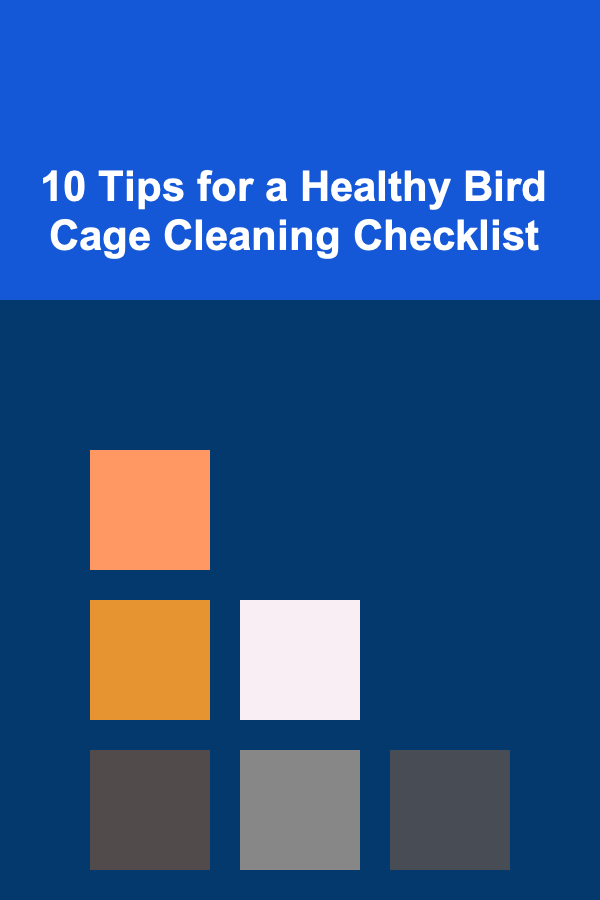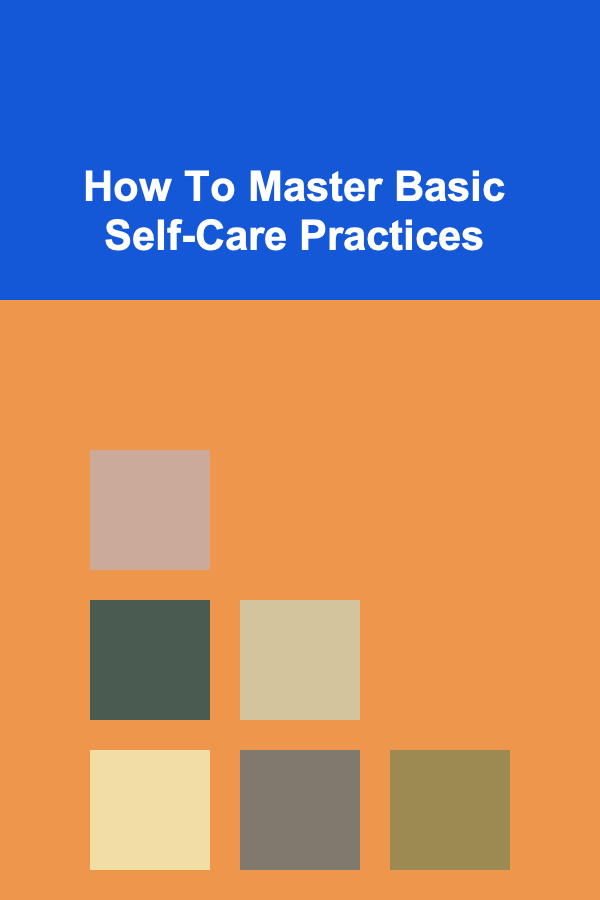
10 Tips for a Healthy Bird Cage Cleaning Checklist
ebook include PDF & Audio bundle (Micro Guide)
$12.99$9.99
Limited Time Offer! Order within the next:

Maintaining a clean and safe environment for your pet bird is essential for their health and well-being. A dirty birdcage can lead to the development of bacteria, mold, and parasites, which can cause serious illnesses in your bird. Additionally, a clean cage promotes a happier, more comfortable living space for your feathered companion.
Here's a comprehensive guide with 10 essential tips for keeping your bird's cage clean and healthy. From daily routines to monthly deep cleans, these tips will help you create an environment that supports your bird's physical and emotional health.
Establish a Daily Cleaning Routine
A daily cleaning routine is crucial for ensuring that your bird's cage stays hygienic and comfortable. A few minutes each day can help prevent the buildup of waste, food crumbs, and droppings, which can quickly lead to unsanitary conditions.
Daily Cleaning Tips
- Remove droppings: Birds often poop frequently, so it's essential to remove droppings from the cage bars, perches, and food bowls every day. You can use a small hand broom or paper towels to gently sweep up the waste.
- Change food and water: Remove any leftover food and change the water daily. Birds can be sensitive to stale or contaminated food and water, which can lead to health problems.
- Wipe down surfaces: Use a damp cloth to wipe down the cage walls and other surfaces to remove any dust, food, or droppings. Be sure to clean the bars, corners, and any other hard-to-reach areas.
- Check for mold: Mold can develop quickly in moist areas, especially around water dishes. Make sure to inspect the cage for any signs of mold or mildew, and clean the affected areas immediately.
Clean and Disinfect Perches
Perches are one of the most critical elements of your bird's cage, as they provide a place for your bird to rest and exercise. Over time, perches can accumulate droppings, dirt, and bacteria, so it's essential to clean them regularly.
Perch Cleaning Tips
- Remove perches: Take the perches out of the cage for cleaning. This will give you better access to all surfaces, ensuring that you thoroughly clean and disinfect them.
- Scrub perches: Use a mild soap or bird-safe disinfectant to scrub the perches. You can use a soft brush or sponge to clean the perches, ensuring that any debris or waste is removed.
- Dry thoroughly: After cleaning the perches, dry them completely before placing them back in the cage. Moisture can promote bacterial growth, so it's important to ensure that the perches are completely dry before reuse.
Sanitize the Food and Water Dishes
Food and water dishes can be breeding grounds for bacteria and mold, especially if they are not cleaned regularly. It's essential to sanitize your bird's dishes every day to ensure that they are free from harmful germs.
Food and Water Dish Cleaning Tips
- Wash with soap and water: Use a mild dish soap to clean your bird's food and water dishes. Rinse thoroughly to remove any soap residue, as it can be harmful to your bird if ingested.
- Disinfect regularly: Once a week, disinfect the dishes with a bird-safe disinfectant to ensure they are free from harmful bacteria. Be sure to rinse the dishes well after disinfecting to remove any leftover cleaning solution.
- Use multiple dishes: To prevent contamination, consider using separate dishes for water and food. This will help ensure that your bird's food stays fresh and clean, and that water remains free from debris.
Deep Clean the Cage Every Week
While daily cleaning is essential, it's also important to do a more thorough, deep clean on a weekly basis. This helps remove any accumulated waste or grime that may have been missed during daily cleaning.
Weekly Deep Cleaning Tips
- Remove everything from the cage: Start by taking out all accessories, toys, food dishes, and perches. This will give you complete access to the cage itself and allow for a more thorough cleaning.
- Vacuum or sweep the bottom of the cage: Remove any debris, old food, and droppings from the cage floor. If you use bedding material like paper or sand, dispose of it properly and replace it with fresh bedding.
- Clean the bars and walls: Wipe down the cage bars and walls with a damp cloth. Use a bird-safe cleaning solution to remove any buildup of waste, dirt, or grime. Pay close attention to the corners, as they often accumulate debris.
- Scrub the bottom tray: The bottom tray of the cage can quickly become dirty from droppings and spilled food. Remove it and scrub it with soap and water, then disinfect it before replacing it in the cage.
Check for Pests and Parasitic Infestations
Birds can sometimes carry pests or parasites, such as mites or lice, which can quickly spread in their environment. It's essential to regularly check your bird's cage for signs of pests and take immediate action if you notice any issues.
Pest and Parasitic Infestation Tips
- Look for signs of pests: Check your bird's feathers and skin for signs of mites, lice, or other pests. These pests may cause itching, feather loss, or discomfort in your bird. If you notice any unusual signs, consult a veterinarian.
- Inspect the cage: Check the cage for any signs of pests or eggs. Look closely at the nooks and crannies, as pests can hide in hard-to-reach places. If you find evidence of pests, clean the cage thoroughly and consider using a bird-safe pest control method.
- Maintain good hygiene: Keeping the cage clean and free of waste will help prevent pests from thriving. Regular cleaning and disinfecting are your best defense against parasitic infestations.
Rotate and Replace Toys Regularly
Birds love to play with toys, and they can quickly become dirty or damaged with frequent use. Rotating and replacing toys ensures that your bird always has a safe, clean, and engaging environment.
Toy Cleaning Tips
- Wash toys regularly: Clean toys like swings, bells, and chew toys regularly using soap and water. Rinse thoroughly to remove any soap residue, which could harm your bird.
- Rotate toys: Birds can get bored with the same toys, so it's a good idea to rotate toys in and out of the cage. This keeps your bird engaged and helps maintain the freshness of the toys.
- Inspect toys for damage: Before putting toys back in the cage, check for any wear or damage. Broken or unsafe toys should be discarded and replaced to prevent injury.
Use Safe Cleaning Products
When cleaning your bird's cage, it's essential to use safe, non-toxic cleaning products. Many commercial cleaning products contain chemicals that can be harmful or even deadly to birds if ingested or inhaled.
Safe Cleaning Product Tips
- Use bird-safe cleaners: Look for cleaning products specifically designed for bird cages. These are free from harmful chemicals and are safe to use around your feathered friend.
- Avoid harsh chemicals: Do not use products that contain ammonia, bleach, or other harsh chemicals. These substances can be toxic to birds and may cause respiratory issues or other health problems.
- Natural cleaners: Consider using natural cleaning solutions like vinegar and water or baking soda to clean the cage. These products are safe for birds and can effectively remove dirt and grime.
Maintain Proper Ventilation
Proper ventilation is essential for maintaining a healthy bird cage environment. Stale air can lead to the buildup of dust, bacteria, and odors, which can negatively affect your bird's health.
Ventilation Tips
- Place the cage in a well-ventilated area: Avoid placing your bird's cage in areas with poor airflow, such as near vents, in a basement, or in an enclosed room. Proper airflow will help keep the air fresh and reduce the risk of respiratory issues.
- Clean air filters regularly: If you use air purifiers or ventilation systems, make sure to clean or replace the filters regularly to prevent dust and allergens from accumulating.
- Avoid drafts: While proper ventilation is important, make sure your bird's cage is not placed in a drafty area. Sudden temperature changes or direct exposure to drafts can stress your bird and make them more susceptible to illness.
Be Mindful of the Cage Location
Where you place your bird's cage can have a significant impact on their overall health. The right cage location promotes comfort, hygiene, and safety.
Cage Location Tips
- Avoid direct sunlight: While birds love natural sunlight, it's important not to place the cage in direct sunlight for long periods. Excessive heat can cause stress or overheating.
- Keep the cage away from kitchen areas: The kitchen contains many hazards for birds, such as fumes from cooking, chemicals, and hot surfaces. Keep the cage away from the kitchen to ensure your bird's safety.
- Consider the noise level: Birds are sensitive to loud noises, so avoid placing the cage in areas with high noise levels, such as near TVs, speakers, or loud household appliances.
Regularly Check Your Bird's Health
Lastly, it's important to regularly monitor your bird's health, as changes in behavior or appearance can indicate potential health issues. Keeping your bird's cage clean is just one aspect of their overall well-being.
Health Monitoring Tips
- Observe your bird: Pay attention to your bird's behavior, eating habits, and overall health. If you notice any changes, such as a loss of appetite, lethargy, or abnormal droppings, consult with a veterinarian immediately.
- Regular vet check-ups: Schedule regular veterinary check-ups to ensure your bird is healthy and free from any parasites or illnesses.
- Maintain a balanced diet: A clean cage is important, but so is providing a balanced, nutritious diet. Offer fresh fruits, vegetables, and high-quality bird pellets to keep your bird in good health.
By following these 10 essential tips for cleaning and maintaining your bird's cage, you can create a healthy, comfortable environment for your feathered friend. Regular cleaning, proper care, and attention to detail will not only improve your bird's living conditions but also promote their long-term well-being. Happy cleaning!
Reading More From Our Other Websites
- [Home Maintenance 101] How to Protect Your Home's Exterior from Weather Damage
- [Organization Tip 101] How to Use Tote Bags for Quick Fishing Outings
- [Home Family Activity 101] How to Start a Family Cooking Tradition with Simple Recipes
- [Biking 101] Top 5 Bike Brands You Should Know for Quality and Performance
- [Sewing Tip 101] How to Construct a Modular Sewing Kit for On‑The‑Go Repairs
- [Organization Tip 101] What Tips Can Help You Organize Your Pet Supplies?
- [Stamp Making Tip 101] Materials Matter: Choosing the Best Wood and Tools for Hand-Carved Stamps
- [Stamp Making Tip 101] DIY Delight: Creating Custom Stamps with a Beginner's Kit
- [Home Maintenance 101] How to Stain Your Porch or Deck Like a Pro: A Step-by-Step Guide
- [Home Soundproofing 101] How to Use Foam Panels for Cost-Effective Soundproofing

How to Create a Simple and Effective Chore Chart
Read More
How to Host a Family Talent Show and Award Ceremony
Read More
How to Plan for Unexpected Expenses Without Going into Debt
Read More
How To Master Basic Self-Care Practices
Read More
How to Learn a Language While Working Full-Time
Read More
How to Master the Art of Networking
Read MoreOther Products

How to Create a Simple and Effective Chore Chart
Read More
How to Host a Family Talent Show and Award Ceremony
Read More
How to Plan for Unexpected Expenses Without Going into Debt
Read More
How To Master Basic Self-Care Practices
Read More
How to Learn a Language While Working Full-Time
Read More